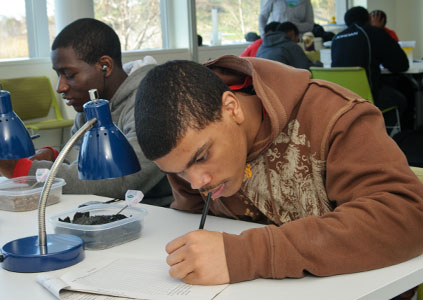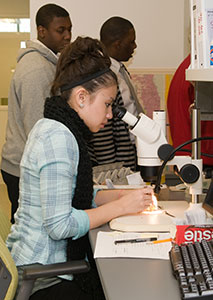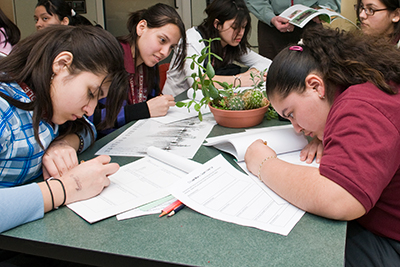Climate Change in My Backyard

With support from NASA, and in collaboration with the National Ecological Observatory Network (NEON) and schools and teachers throughout Illinois, the Chicago Botanic Garden has developed the Climate Change in My Backyard curriculum series. The project targets grades 5 to 12.
"The reason we developed this curriculum is because there were few or no regionally relevant climate-change curricula out there," said Jennifer Schwarz, Ph.D., associate vice president of education for the Garden. Lesson plans and activity support materials on this page are free to all.
Schwarz Ballard acknowledges that the facts of climate change can be overwhelming. "We are trying to give people a sense of empowerment because, without it, they are not going to act—not personally or for larger global solutions," she said. Schwarz began working with teachers in the Chicago area in 2009 to develop the program with support from program manager Rebecca Barak and in consulation with Kay Havens-Young, Ph.D., the Garden's director of plant science and conservation. The curriculum then was pilot-tested in 17 Illinois schools from Waukegan to Cairo. Throughout the process, the Garden trained teachers on best ways to deliver the curriculum.

This unique, technology-rich curriculum series integrates student participation in Budburst with NASA climate data, to teach about climate change and its consequences for our environment using an earth-systems science approach. (Budburst is a national citizen-science project that contributes data to ongoing research on climate change.) Aligned with the Common Core and Next Generation Science Standards, the curriculum incorporates best practices in inquiry teaching and scaffolds students' use of science practices to support learning of disciplinary core ideas and connecting cross-cutting concepts.
About the Curriculum
The series is made of three complete curricula, targeting different age levels—grades 5 to 6, grades 7 to 9, and grades 10 to 12. Each curriculum comprises four units that address critical aspects of a systems approach to understanding climate and its impacts on humans and the environment:
- Understanding the Earth as a system
- Identifying key changing conditions of the earth system
- Recognizing earth-system responses to natural and human-induced changes
- Predicting the consequences of changes for human civilization
The climate-change curriculum is designed to answer four key questions posted by NASA:
- How is the global earth system changing?
- What are the key changing conditions of the earth system?
- How does the earth system respond to natural and human-induced changes?
- What are the environmental and human consequences?
 Students explore these topics in the context of an investigation of how climate affects their local plants and ecosystems. They collect data to contribute to Budburst, and analyze the data they collect in the context of NASA and NOAA climate and atmospheric data, as well as NASA satellite imagery. They learn about the effects of changing climates on ecosystems through participation in Budburst, and then broaden that perspective by exploring the effects of climate change on human communities around the world. Looking at large data sets in the context of local, visible changes to plant biology makes climate change a tangible phenomenon, and provides a context for making meaning of abstract data.
Students explore these topics in the context of an investigation of how climate affects their local plants and ecosystems. They collect data to contribute to Budburst, and analyze the data they collect in the context of NASA and NOAA climate and atmospheric data, as well as NASA satellite imagery. They learn about the effects of changing climates on ecosystems through participation in Budburst, and then broaden that perspective by exploring the effects of climate change on human communities around the world. Looking at large data sets in the context of local, visible changes to plant biology makes climate change a tangible phenomenon, and provides a context for making meaning of abstract data.
In addition to the curriculum, the Garden has associated professional-development offerings available for teachers and schools to ensure that educators have the background understanding and pedagogical expertise to implement the curriculum successfully in the classroom. Moving forward, the Garden plans to continue consulting with schools to help them introduce the climate-change curriculum and to offer teachers in those schools additional opportunities to hone their skills.
The curriculm helps fulfill the Garden's science and education missions by motivating students to apply what they learn in scientific ways that will help us all adjust to and survive climate change, according to Schwarz: "Then, we will have done a good service to ourselves, to them, and to the planet."

